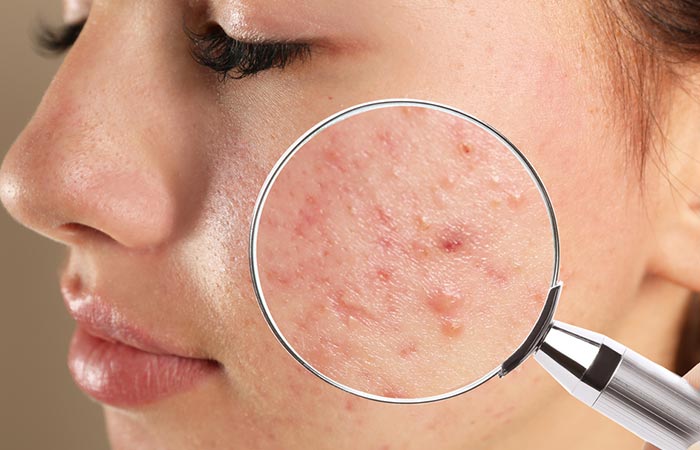Wearing sunscreen is a crucial element in the skin care routine. But are all sunscreens safe? Sunscreen adverse effects have been a cause for concern for a while now. Chemical sunscreens with tetracyclines, phenothiazines, and sulfa medications may do more damage than good. Therefore, it is essential to know what goes into your sunscreen and how it impacts you. Read this article to know more. Scroll down.
How To Use Sunscreen
-
Apply sunscreen all over the exposed skin.
-
You must do this 30 minutes before venturing out in the sun.
-
It is advised to re-apply with the sunscreen after swimming, exercising, etc.
-
Even if you are indoors, keep re-applying sunscreen after every 4 hours.
Side Effects Of Sunscreen
Here are some of the side effects of sunscreen:
1. Allergic Reactions
Sunscreens include some chemicals that can cause skin irritation such as redness, puffiness, dehydration, irritation, flaking of the skin, and itchiness. Some individuals develop severe allergic reactions with rashes and intense irritation. This allergic reaction can be the result of chemicals present in sunscreens like fragrances and preservatives. PABAi is effectively used in many commercial sunscreens that can induce a high prevalence of allergic reactions. Hence, this is getting removed from many popular sunscreens of reputed brands.
You can even purchase sunscreens with the label ‘hypoallergenic’. Sunscreens that don’t contain PABA are often labeled, but some other compounds can contribute to an allergic problem. If you are not positive about the allergic reaction that may be caused by a sunscreen product, get a patch test done by a dermatologist. You can use sunscreens that contain zinc oxide, as they are less allergic.
2. Sunscreens Can Make Acne Worse

If you have acne-prone skin, some compounds in the sunscreen product can worsen your problem. To get rid of this adverse effect of sunscreen, you can choose non-comedogenici and non-oily sunscreens. It is suggested to use a sunscreen best appropriate for your skin type. Avoid using body sunscreens on the face, as these are too weighty.
3. Eye Irritation
Getting sunscreen into the eye can cause discomfort and irritation. This can also contribute to blistering and transient sensitivity to light. Some claim that chemical sunscreens can also cause blindness. If the sunscreen seeps into the eyes, cleanse them thoroughly with cold water or see your doctor.
4. Increases The Risk Of Breast Cancer
Sunscreen includes ingredients that can have estrogenic effectsi on breast cancer cells. Some sunscreens can have effects on blood estrogens levels. Avoid using chemical sunscreens on your children, as their skin tends to assimilate the chemicals instantly.
Benzophenone-3 is a common ingredient found in chemical sunscreens. It increases tumor cell proliferation and promotes breast cancer. A study conducted on mice showed that the use of BP-3 increased the proportion of epithelial malignancies in mice that were administered an adult-restricted diet high in saturated animal fat (HFD).
5. Pain in Hairy Areas
There are varieties of sunscreen that can be perplexing to choose from. They are also available in many forms like lubricants, moisturizers, mists, ointments, balms, and wax sticks. It is your particular option to choose the sort of sunscreen. Gels are ideal for pubescent areas like the cranium or the male bosom. Some sunscreens can contribute to tightening or dehydrating of the skin and can cause irritation in unkempt areas.
6. Pus in the Hair Follicles

This is an uncommon adverse effect that occurs. However, it is not usually owing to sunscreen. You need to consult a dermatologist immediately if you are experiencing any pain or discomfort.
Tips To Avoid The Side Effects Caused By Sunscreen
-
Wash off and cease using the sunscreen if it causes redness or irritation.
-
Talk to your doctor or request the pharmacist’s advice about using a new sunscreen.
-
Reapply sunscreen every 2 hours if you are outside for extended periods.
-
If you are using the lip salve form of sunscreen, apply it on the lip area only.
-
Choose Sunscreen for your children very prudently.
-
Avoid using sunscreen on toddlers younger than 6 months.
-
Choose oil-free and non-comedogenic sunscreen if you have oily skin.
Read Also: Achieving Glowing Skin with a Skin Care Routine
Since we have discussed methods to prevent sunscreen adverse effects, let’s address a popular question: Is Oxybenzone in sunscreens detrimental or safe? Scroll down to read.
Is Oxybenzone In Sunscreen Safe?
Oxybenzone is a common constituent in sunscreens that helps shield the skin from harmful UVA and UVB radiation linked to skin cancer. It absorbs these rays, transforms them into heat, and dissipates them from the epidermis, reducing the risk of DNA damage.
However, oxybenzone is somewhat controversial due to claims of being a “potential hormone disruptor”. It is said to interfere with the endocrine system that regulates various biological processes. Yet, the clinical significance of these concerns remains inconclusive.
